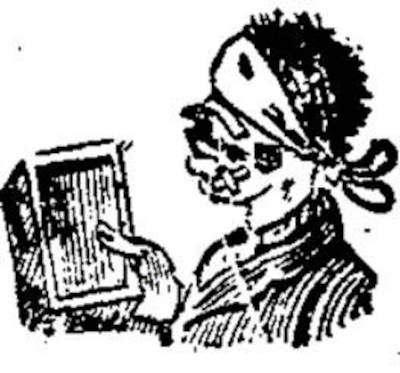This article has been transcribed from a copy of the Cardiff Times in the online collection of scanned Welsh newspapers 1804-1919 in the National Library of Wales, with grateful recognition of the free access accorded to all readers. Paragraph breaks have been introduced for easier reading.
Samuel is now presenting himself more fully than ever before, and draws authority from his courtroom experience. Most of his regional language is Yorkshire, and very little needs explanation. Fibsey Slack can possibly be translated as ‘Lying Vale’, and ‘sich disgustful wack’ as ‘such distasteful work’. Elsewhere Samuel explains a ‘masher’ as ‘the sort of young man who fancies that he can overcome and overawe everybody by the potency of his attractions. (See ‘Samuel on Slang’, 4th May 1889.) A ‘dock’ case was a case in which a ‘dock-brief’ was handed direct from an unrepresented prisoner in the dock to a barrister. A prisoner in the dock had the right to ask to be represented by any barrister present in court, and his ‘dock-brief’ would then be handed direct to a barrister, instead of passing through the hands of a solicitor, as was otherwise the normal procedure. (See ‘dock-brief’ in OED.) The high-sounding formula ‘a full, true. and particular account’ was often used in seventeenth- and eighteenth-century pamphlets on subjects such as the suspected poisoning of King Frederik III of Denmark, and the escape of the future Charles II from Parliamentarian troops after the battle of Worcester. – The ‘Great Unpaid’ is Samuel’s satirical designation of middle-class people who filled the many unpaid offices on boards, in court, etc., and gestures at the term the ‘Great Unwashed’ for the working classes. —— David Skilton

The ‘masher’ sergeant – old type.
T one period o[f] my career, sir, I was a sort of semi-clerk (salary nil) to a relative, Clerk to the Justices, employed at a police-court: and plenty of food for observation did I find there. The prevailing idea with almost all classes of the community in regard to police-courts it that of the old women who, when called as witnesses, vehemently declare that they ‘wor niver in no coorts afore i' ther lives, an' doan't know what they've been browt theer for nah – sich disgustful wack,’ and I scarcely wonder at this prevalent feeling, for if you go as a prosecutor or witness you stand an exceedingly good chance of being bullied by the solicitor on the other side, or being sat upon by a splenetic J.P., or of being likewise bullied and told to ‘speak up’ by a burly ‘bobby,’ and if you go in the capacity of defendant – well, there, need I dwell on the unpleasantness of that?
Besides, the atmosphere is generally not all that it should be, and most of the sights presented when ‘dock’ cases are on are of the painful class, and the man or woman who goes to a police-court usually associates that visit with some unpleasant and untoward incident. Of course I am not now including that very common class, police-court loungers – men who have no work, and don't want any, and spend one half their day listening to the cases at the police-courts, and the other half where ‘pints’ [pun on ‘pints’/‘points’] are cheap. The actual courts themselves have often been described, and no wonder, for the witnesses alone provide a number of types infinite and yet easy to be classified on broad lines.
There is the witness of an aggressive deposition, who goes into court with a sort of ‘I-don 't-mean-to-take-no-notice-of-nobody, I don't, let 'em try and bully me,’ and who usually gets egregiously badgered if a smart solicitor be pitted against him; there is the nervous witness who tears her (it is generally a woman) right glove in getting it off and then drops the ‘book’ [Bible]; there is the voluble witness (very frequently from the ‘distreshful counthry’ [Ireland]) who tells the court nearly everything but what it wants to know; there is the reproachful and semi-apologetic witness who, on the prisoner or defendant exclaiming ‘Niver,’ or something similar, rejoins with an appealing ‘Oh, you know you did,’ as though wanting confirmation from the incriminated one – a likely thing to expect; there is the blushing young woman who, when told to kiss the book, nearly kisses the policeman standing near; there is the – but I might devote the whole of this article to delineating witness-types. It is the same with solicitors. There is the, smart, snappy ‘I've got no flies on me’ young man; there is the ponderous man who seems to be weighed down by the weight of his responsibility in defending, say, a gentleman who has been charged with stealing a ham; there is the ‘pooh-pooh’ style of lawyer who always endeavours to make light of matters as though he would say (when he is for the defence) ’this is a paltry case, your worships;’ and there is the bellicose, tear 'em, mean-to-fight-till-I-die attorney, who generally gets at loggerheads with the justices – and does his client no good as a consequence. I have known more than one of this kind.

This is t’brick he hat ma wi’ fair at t’top o’ t’head –an’ Ah want t’law o’ him.
But leaving the realm of the actual court itself, what fine studies are to be found in the offices for granting summonses, &c., and the ‘charge office’ of the police department below. In regard to the former, what sights have I not seen? There is the young swell, looking frightfully ashamed of himself, who has a few hours previously ‘got on the spree,’ pawned his watch and guard [protective case], and lost [(]or been robbed of) the ticket. He has come now to make an affidavit to enable him to obtain a new ‘tombstone’ [pawn ticket]. Very possibly the justice before whom the affidavit will go is an old friend of his father's. And then what a host of respectable people come to make interest with one of the justices (mayhap a friend of other and were prosperous days) for a relation who has got into some species of trouble connected with the police and their duties. Infinitely touching are some of these interviews, and infinite is the good that our ‘great unpaid’ (a most maligned class) can sometimes do. I have myself known them to pay fines out of their own pockets that a stern sense of duty compelled them to inflict. Mothers come to plead, oh, how earnestly for their ne'er-do-well sons, and I have seen such respectable and reputable men come, with a world of pathos and misery in their faces, to place their full wretchedness in respect of some ruined daughter before justices who have known and respected them all their lives. I won't go seriously into the question, but I can say (with a rather extended acquaintance of police-courts) this – that I do not believe in stipendiaries in most towns; for tempering justice with mercy (which should be the foundation of all justice, human and Divine) give me that best abused class on earth – the ‘Great Unpaid.’

‘He done it for spite – put the child’s whistle on my brain.’
What peculiar customers we did use to have making applications in that office. I have seen a man who had been assaulted grievously, and who had ‘a face on him’ which seemed to suggest that he had been dragged nose downwards along a road paved with broken granite and glass bottles, bring with him, carefully wrapped up in a very dirty handkerchief, the half-brick with which he had been struck; and repeatedly have I known women bring handfuls of frousy hair, which they alleged their husbands had torn out, to show us when the summons or warrant was issued. I well recollect one case of this kind where the husband successfully pleaded in court that he had not torn the hair out, but that his wife had been saving it up for some time to make a plait of. The persons, generally women, who came for ‘provoking language’ summonses against neighbours came not in single files, but in battalions [compare Hamlet IV.v.76-7], and ridiculous indeed were their applications for the most part. ‘Can I have the law of a hussy what's bin callin’ me a “creeper”?’ was one application that I well remember, and on another occasion a woman who had some suspicion of a moustache that many a budding masher might be proud of expressed a desire to have a ‘law do’ in regard to a neighbour who had referred to her as ‘tin-whiskers.’ I was once applied to for a warrant by a well-dressed man. who at first seemed quite rational in his manner, against his brother-in-law, who had committed the awful depravity of putting a child's ‘squeaker’ in his (applicant's) head, in consequence of which – as was most gravely and lucidly explained to me – every time the appiicant drew the air up his nostrils it made the squeaker act – a most unpleasant circumstance assuredly. Reverting to ‘provoking language’ cases I recollect a woman coming from a place which I will call Fibsey Slack (mark the name [‘Lying Dale’]) provoking a display of mild facetiousness in one of the justices. The woman had very volubly stated her case, and then said his worship, ‘What name did you call her in return?’ ‘Why, yer worship, there wor a good deal o' slack talk,’ admitted the woman. ‘Yes, there would be,’ said the J.P.—'Fibsey Slack talk.’
Of people who were trying to square cases or were trying to get information as to the probable grounds upon which the prosecution would go we had no end, and mightily clever and ingenious did they think themselves. And what fun it used to be to watch the ‘touting’ attorneys or their clerks. Take one common dodge of theirs. A woman, half in tears, would, we will say, stroll out into lobby after issuing a summons. Enter to her the smart solicitor's clerk with a sympathetic air (ye gods, a police-court solicitor's clerk with a sympathetic manner.) ‘What's up, lass?’ he will ask familiarly. Possibly, after a little more interrogation, the woman, moved by his friendly air; will confide to him that she has no solicitor and that ‘t'other side has getten a lawyer ta pleead for them,’ and a bargain will be struck. Then there are usually attempts, from precisely the same quarter, to get at the police officers whose duties lie in the ‘charge office,’ and who, when a man is locked up, protesting his innocence, can quickly say, ‘Very well, lad, if you want to prove your innocence you ought to get Mr Pleadwell, the solicitor, to appear for you. He's a rare talker; shall I send for him for you?’ In such a case the officer will, of course, ‘stand in’ with the solicitor – but, for the honour of the profession and of the police, I am bound to add that these cases are not common. But as regards the ‘Charge Office,’ which provides many a dramatic scene, I will give you a full, true. and particular account anon.
Links to Related Material on the law and law enforcement
- Samuel on Policemen
- Samuel at a mock trial
- Samuel on the British Detective – what he is and what he is not
Last modified 14 March 2022